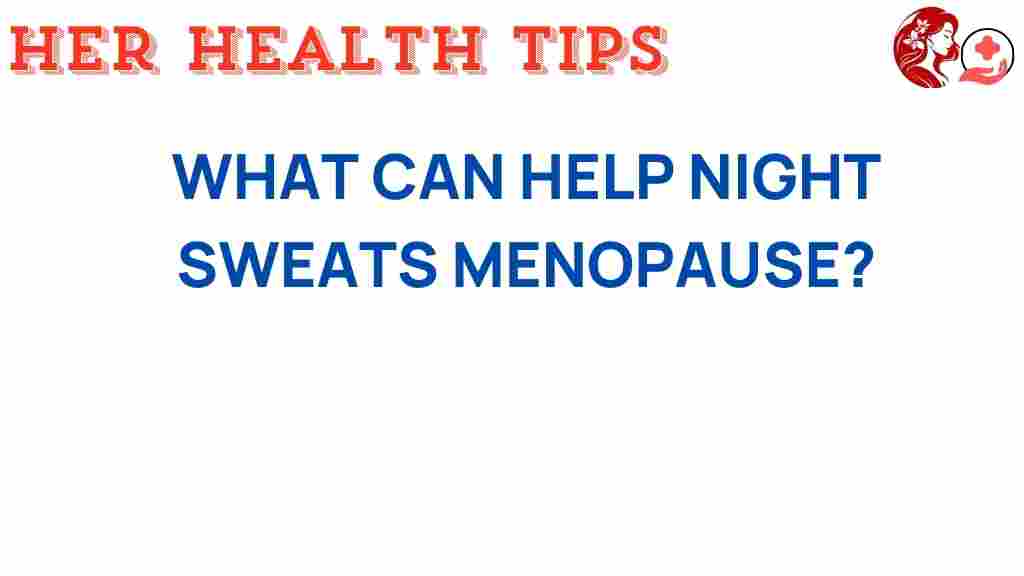Unraveling Night Sweats: Effective Solutions for Menopause Relief
Night sweats are a common yet distressing symptom of menopause that can significantly affect sleep quality and overall comfort. As women transition through this natural phase of life, hormonal changes can lead to various symptoms, including hot flashes and night sweats. Understanding these symptoms and finding effective solutions is essential for enhancing women’s health during menopause. This article will explore various approaches, including lifestyle changes, hormone therapy, herbal remedies, and more, to alleviate night sweats and improve comfort during this transitional period.
Understanding Night Sweats and Menopause
Night sweats are episodes of excessive sweating during sleep, often leading to discomfort and disrupted sleep. They are typically associated with menopause due to hormonal fluctuations, particularly a decrease in estrogen levels. This hormonal imbalance can trigger the body’s thermoregulatory system, causing hot flashes and night sweats.
Menopause usually occurs between the ages of 45 and 55, but it can vary significantly from woman to woman. Recognizing the symptoms and understanding their causes can help women seek appropriate relief.
Common Symptoms of Night Sweats
- Intense sweating during the night
- Feeling hot and uncomfortable
- Frequent awakenings due to sweating
- Chills following episodes of sweating
- Soaked bedding and nightclothes
Why Do Night Sweats Occur?
Night sweats during menopause can be attributed to several factors:
- Hormonal Changes: Decreased estrogen levels can disrupt the hypothalamus, which regulates body temperature.
- Stress and Anxiety: Emotional factors can exacerbate the frequency and intensity of night sweats.
- Health Conditions: Certain medical conditions and medications can also contribute to night sweats.
Effective Solutions for Night Sweats
Relieving night sweats requires a multi-faceted approach. Here are several effective solutions that can help manage this menopausal symptom:
1. Hormone Therapy
Hormone therapy (HT) involves the administration of estrogen and/or progesterone to alleviate menopausal symptoms. It is one of the most effective treatments for hot flashes and night sweats.
- Types of Hormone Therapy:
- Estrogen therapy
- Combined hormone therapy (estrogen and progesterone)
- Bioidentical hormone therapy
Before starting hormone therapy, it is crucial to consult with a healthcare provider to discuss the potential benefits and risks based on individual health history.
2. Lifestyle Changes
Making certain lifestyle changes can significantly alleviate night sweats and improve sleep quality. Consider the following tips:
- Maintain a Healthy Weight: Excess weight can contribute to increased body temperature and sweating.
- Dress Comfortably: Wear loose-fitting, breathable pajamas made of natural fibers, such as cotton.
- Optimize Sleep Environment: Keep your bedroom cool, use breathable bedding, and consider using a fan.
- Practice Relaxation Techniques: Stress management through yoga, meditation, or deep breathing can help reduce the frequency of night sweats.
3. Herbal Remedies
Many women turn to herbal remedies for menopausal relief. Some popular options include:
- Black Cohosh: Known for its potential to reduce hot flashes and night sweats.
- Red Clover: Contains phytoestrogens that may help balance hormones.
- Dong Quai: Often used in traditional medicine to support hormonal balance.
While herbal remedies can be beneficial, it is essential to consult with a healthcare provider before starting any new supplement, especially if you are taking other medications.
4. Dietary Adjustments
What you eat can also influence the severity of night sweats. Consider the following dietary adjustments:
- Stay Hydrated: Drink plenty of water throughout the day to help regulate body temperature.
- Avoid Triggers: Limit caffeine, alcohol, and spicy foods, which can exacerbate hot flashes and night sweats.
- Incorporate Phytoestrogen-Rich Foods: Foods like soy products, flaxseeds, and whole grains may help balance hormones.
5. Sleep Hygiene Practices
Improving sleep quality can help manage night sweats. Here are some sleep hygiene practices to consider:
- Establish a Routine: Go to bed and wake up at the same time each day.
- Create a Relaxing Environment: Make your bedroom a sanctuary for sleep—keep it dark, quiet, and cool.
- Avoid Electronic Devices: Limit screen time before bed, as blue light can interfere with sleep.
Troubleshooting Tips for Night Sweats
If you find that your night sweats persist despite trying these strategies, consider the following troubleshooting tips:
- Keep a Symptom Diary: Track your night sweats, dietary habits, and stress levels to identify patterns and triggers.
- Consult a Specialist: If symptoms are severe, consider consulting a menopause specialist for tailored advice.
- Review Medications: Discuss with your doctor whether any current medications could be contributing to night sweats.
Conclusion
Night sweats are a common symptom of menopause that can disrupt sleep and affect overall comfort. However, with the right strategies, women can find effective relief. From hormone therapy to lifestyle changes, herbal remedies, and improvements in sleep quality, there are numerous options available to manage night sweats and enhance women’s health.
Always consult with a healthcare provider before making significant changes to your treatment plan or lifestyle. Remember that every woman’s experience with menopause is unique, and finding the right combination of solutions may take time.
For more information on menopause and women’s health, check out this resource. You can also explore various herbal remedies at this link.
This article is in the category Reproductive and created by HerHealthTips Team
